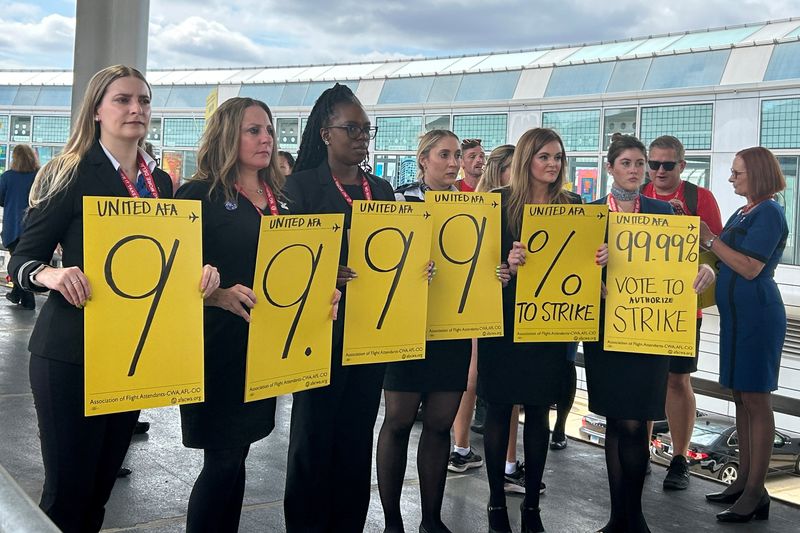
By Rajesh Kumar Singh
CHICAGO (Reuters) – Alaska Airlines flight attendant Rebecca Owens works 10 hours a day but is paid only half that time – a legacy of a common policy among U.S. airlines to pay cabin crew members only when planes are in motion. Owens, and thousands of cabin crew like her, want that to change.
In August, 68% of Alaska flight attendants rejected in a ratification vote a contract that would have increased average pay by 32% over three years. It was also the first labor agreement to legally require airlines to start the clock for paying flight attendants when passengers board, rather than when the plane begins taxiing down the runway.
Delta Air Lines (NYSE:), the only major U.S. airline whose flight attendants are not unionized, set an entry-level compensation for its flight attendants at half their hourly wages in 2022 as it tried to organize.
Alaska and union leaders resumed federally mediated contract negotiations this week.
“I want to be compensated for my time at work and want a living wage so you can stand on your own two feet while you have this job,” said Owens, 35. She said without her husband’s income, her family wouldn’t be able to survive. would be able to afford basic necessities.
The negotiations in Alaska are closely watched because one airline’s contract tends to become an industry benchmark. Cabin crew at United Airlines, Frontier and American Airlines (NASDAQ:) regional subsidiary PSA Airlines are also negotiating new employment contracts.
Crews at Southwest Airlines (NYSE:) rejected two contract offers before ratifying a deal in April that included a 22% pay increase this year and 3% annually through 2027.
Flight attendants have negotiated more confidently this year, encouraged by improved airline revenues and stellar pay deals negotiated by pilot unions and Boeing (NYSE:) factory workers over the past two years, according to interviews with a dozen airline workers and unions. civil servants.
Flight crews told Reuters these negotiations were also driven by years of resentment over wages that have lagged behind inflation while working hours have increased, damaging their quality of life.
Alaska and United cabin crew have given their unions permission to strike if negotiators fail to reach a contract agreement.
Responding to a Reuters query, Alaska Airlines said its goal is to “provide flight attendants – and all employees – with competitive wages and benefits.” United said it is offering “significant” pay increases to complement recently approved deals at other airlines, as well as an initiation allowance. The company has also offered to reduce “on-call reservation periods” – when flight attendants are on standby and must report to work at short notice – to 12 hours from the current 24-hour period, the company said.
“We continue to work on an industry-leading contract,” a United spokesperson said, adding that federally mediated contract negotiations are expected to resume early next year.
But the Association of Flight Attendants-CWA (AFA), which represents United’s flight attendants, told Reuters that the airline was seeking several concessions, including increasing eligibility requirements for medical benefits and rolling back sick leave coverage in return for a reduced ‘call reserve’. periods.”
“United’s offers would come with concessions on other parts of the contract that no other working group has agreed to,” AFA said. When asked about the concessions, United declined to comment.
BURNOUT
In previous contract negotiations, airlines have secured employee concessions as the industry struggled due to economic downturns or the impact of the COVID pandemic.
This year, however, many U.S. airlines have posted healthy profits, and cabin crew feel like they’ve more than earned a bigger piece of the pie.
United’s cabin crew have not had a pay increase since 2020. The Chicago-based airline unveiled a $1.5 billion stock buyback plan in October. “Flight attendants are really, really angry,” said Sara Nelson, international president of AFA, which represents more than 50,000 cabin crew. crew at 20 airlines, including Alaska.
“They can’t pay their bills.”
Some new hires are being forced to live in their cars because they can’t pay the rent, said Ken Diaz, head of United’s flight attendant union. A starting salary at United is $28.88 per hour. In Alaska, the base pay for a newly hired flight attendant is $27.69.
High on the priority list for flight attendants is getting paid for hours worked, not just when the plane is in motion. A San Francisco-based United flight attendant told Reuters he earns only $2,400-$2,500 a month (before taxes) despite working more than 200 hours. Some of his colleagues supplement their income by driving for Uber (NYSE:) and DoorDash (NASDAQ:), he said.
A flight attendant aboard Alaska’s Boeing 737 MAX plane, which lost its door panel in mid-air in January, had a second job as a delivery driver for Amazon (NASDAQ:), according to testimony released by investigators. The flight attendant, who was not named, had worked two package delivery shifts on the day the door opened.
Some airlines are disappointed with the extra costs associated with paying flight crews for tasks such as boarding passengers and waiting at the airport before and between flights. The union at American has estimated that crews will earn an additional $4.2 billion under the new five-year flight attendant contract, which includes retroactive entry pay and compensation for several hours between flights.

Owens says airlines must rethink their strategy or face an increasingly hostile response from crew members.
“People can only handle so much,” Owens said. ‘They’re tired. They’re burned out.’
Leave a Reply